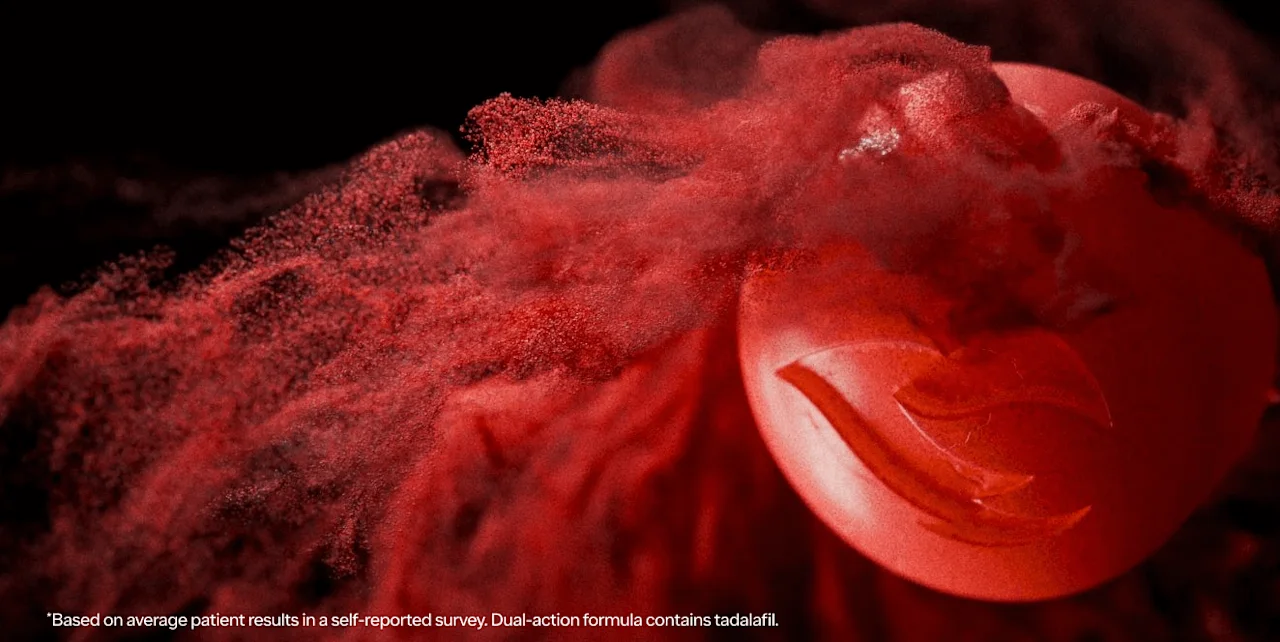Here's what we'll cover
If you’re experiencing erectile dysfunction (ED), low libido, or other sexual challenges, you may be wondering if you can tweak your diet to work in your favor. One spice you might have heard has sexual benefits is cinnamon. But what are cinnamon’s benefits sexually? And can sprinkling the spice really provide benefits in the bedroom?
Ahead, we’ll answer those questions and take a closer look at the sexual benefits of cinnamon and what science says about them.
General health benefits of cinnamon
Cinnamon is a spice that comes from the bark of a type of evergreen tree that’s primarily grown in Southeast Asia as well as other tropical regions. Not only is it high in antioxidants, but cinnamon is also anti-inflammatory. Largely because of these two traits, the spice has been shown to reduce the risk of heart disease, enhance insulin sensitivity and manage blood sugar levels, as well as benefit the brain. In fact, some animal studies suggest cinnamon can help protect against Alzehimer’s disease, though more research on humans is needed.
Additionally, cinnamon may aid in weight loss and support weight management. It’s possible these effects are potentially due to the spice’s ability to regulate blood sugar levels and slightly increase metabolism.
Cinnamon also has some beneficial trace minerals, including zinc, calcium, manganese, potassium, and phosphorus.
Benefits of cinnamon sexually
Before we take a closer look at the sexual benefits of cinnamon, it bears repeating that there isn’t a ton of scientific research on the matter. While more studies on humans are are needed to truly understand how the spice can positively impact your time in the bedroom, for now, here are some of the potential sexual benefits of the spice:
May increase blood flow
Cinnamon can cause blood vessels to relax and dilate (i.e. widen), which can increase blood flow. In addition to benefiting your heart, this effect may also improve sexual function. That’s because healthy blood flow is essential for getting and maintaining erections—so much so, in fact, that erectile dysfunction (ED) is often the result of problems with blood flow (e.g. atherosclerosis, high blood pressure). While animal studies have shown the spice to increase sexual and erectile function in diabetic rats, there has been little-to-no research on cinnamon and ED in humans.
May decrease anxiety and depression
Sexual function is just as much about the mental as it is about the physical.
When it comes to sexual function, the physical factors are just as important as the mental ones. In fact, mental health challenges, such as stress, anxiety, and depression, can inhibit sexual desire, reducing libido and making it harder to perform. They can also contribute to ED. But cinnamon may be able to help with that. In an animal study, cinnamon oil was found to increase brain-derived neurotrophic factor or BDFN (i.e. a protein that helps support the growth of brain cells, helps neurons communicate, and protects neurons from damage) in mice. At the end of the study, the mice exhibited fewer symptoms of anxiety and depression, suggesting that cinnamon may positively impact mood by boosting BDFN. But you know the drill: More research on humans is needed to truly understand the connection between cinnamon and mental health.
May improve sperm quality and fertility
As mentioned above, cinnamon is particularly high in antioxidants that may fend off free radicals and protect the body from oxidative stress, which can otherwise lead to cellular damage and disease. When it comes to “down there,” free radicals can negatively affect sperm quality and quantity as well as contribute to infertility in men. Research shows that antioxidants in general can improve sperm quality, which, in turn, can help with fertility. As for cinnamon, in particular? An animal study found the spice to increase sperm population, motility, and viability in rats over the course of just 28 days. Again, though, this research was on rats; more human studies are needed.
Are there any health risks of cinnamon?
Cinnamon doesn’t present many major health risks for most people. Plus, it’s not considered a common allergy. That being said, there are some things to keep in mind before sprinkling the spice on your food.
For starters, cinnamon can interfere with some medications. People on blood thinners, for example, need to be cautious when it comes to cinnamon since the spice can enhance the effects of these drugs and increase the risk of excessive bleeding. Similarly, those on diabetes medications should be wary of cinnamon, which may cause blood sugar levels to drop too low. Consuming excessive amounts of cinnamon can also damage the liver. Like virtually everything in life, moderation is key when it comes to cinnamon.
If you have any existing medical conditions or are taking any prescription medications, be sure to talk to your healthcare provider before incorporating anything new into your diet—cinnamon included.
Bottom line
Unfortunately, there has not been enough research to confidently determine the sexual benefits of cinnamon, if any, for humans. That being said, animal studies show the spice to positively impact sexual function and wellbeing in a variety of ways, from increasing blood flow to improving sperm quality.
Although it isn’t isn’t going to be the sole answer to any sexual challenges you may be experiencing, cinnamon may be worth giving a go—that is, of course, as long as you first speak to your healthcare provider and make sure it's safe for you. And while you’re at it, don’t be afraid to bring up any concerns; there’s nothing to be embarrassed about and your healthcare provider is best equipped to figure out what might be going on and how to best address it.
DISCLAIMER
If you have any medical questions or concerns, please talk to your healthcare provider. The articles on Health Guide are underpinned by peer-reviewed research and information drawn from medical societies and governmental agencies. However, they are not a substitute for professional medical advice, diagnosis, or treatment.
References
Guha Thakurta, R., Prakash Singh, O., Bhattacharya, A., et al. (2012). Nature of Sexual Dysfunctions in Major Depressive Disorder and Its Impact on Quality of Life. Indian Journal of Psychological Medicine, 34(4), 365–370. doi: 10.4103/0253-7176.108222. Retrieved from https://www.ncbi.nlm.nih.gov/pmc/articles/PMC3662135/
Hernández-Cerda, J., Bertomeu-González, J., Zuazola, P., et al. (202). Understanding Erectile Dysfunction in Hypertensive Patients: The Need for Good Patient Management. Vascular Health and Risk Management, 16, 231–239. doi: 10.2147/VHRM.S223331. Retrieved from https://www.ncbi.nlm.nih.gov/pmc/articles/PMC7297457/
Higaki, H., Onji, M., Takeji, S., et al. (2018). A Case of Severe Drug-induced Liver Injury Caused by Over the Counter Herb (Cinnamon): Review of Literature. Eurasian Journal of Hepato-Gastroenterology, 8(2), 167–171. doi: 10.5005/jp-journals-10018-1284. Retrieved from https://www.ncbi.nlm.nih.gov/pmc/articles/PMC6395486/
Hussain, T., Kandeel, M., Metwally, E., et al. (2023). Unraveling the harmful effect of oxidative stress on male fertility: A mechanistic insight. Frontiers in Endocrinology, 14, 1070692. doi: 10.3389/fendo.2023.1070692. Retrieved from https://www.frontiersin.org/journals/endocrinology/articles/10.3389/fendo.2023.1070692/full
Khaki, A. (2015). Effect of Cinnamomum zeylanicumon on Spermtogenesis. Iranian Red Crescent Medical Journal, 17(2), e18668. doi: 10.5812/ircmj.18668. Retrieved from https://www.ncbi.nlm.nih.gov/pmc/articles/PMC4376985/
Maadarani, O., Bitar, Z., & Mohsen, M. (2019). Adding Herbal Products to Direct-Acting Oral Anticoagulants Can Be Fatal. European Journal of Case Reports in Internal Medicine, 6(8), 001190. doi: 10.12890/2019_001190. Retrieved from https://www.ncbi.nlm.nih.gov/pmc/articles/PMC6726349/
Mohammadabadi, T. & Jain, R. (2024). Cinnamon: a nutraceutical supplement for the cardiovascular system. Archives of Medical Science Atherosclerotic Diseases. doi: 10.5114/amsad/184245. Retrieved from https://www.ncbi.nlm.nih.gov/pmc/articles/PMC11155465/
Nakhaee, S., Kooshki, A., Hormozi, A., et al. (2024). Cinnamon and cognitive function: a systematic review of preclinical and clinical studies. Nutritional Neuroscience, 27(2), 132-146. doi: 10.1080/1028415X.2023.2166436. Retrieved from https://pubmed.ncbi.nlm.nih.gov/36652384/#full-view-affiliation-2
Onder, A., Yilmaz-Oral, D., Jerkovic, I., et al. (2019). Evaluation of relaxant responses properties of cinnamon essential oil and its major component, cinnamaldehyde on human and rat corpus cavernosum. International Brazilian Journal of Urology, 45(5), 1033–1042. doi: 10.1590/S1677-5538.IBJU.2019.0016. Retrieved from https://www.ncbi.nlm.nih.gov/pmc/articles/PMC6844336/
Qin, B., Panickar, K. S., & Anderson, R. A. (2010). Cinnamon: Potential Role in the Prevention of Insulin Resistance, Metabolic Syndrome, and Type 2 Diabetes. Journal of Diabetes Science and Technology, 4(3), 685–693. doi: 10.1177/193229681000400324. Retrieved from https://www.ncbi.nlm.nih.gov/pmc/articles/PMC2901047/
Saylam, B. & Çayan, S. (2020). Do antioxidants improve serum sex hormones and total motile sperm count in idiopathic infertile men? Turkish Journal of Urology, 46(6), 442–448. doi: 10.5152/tud.2020.20296. Retrieved from https://www.ncbi.nlm.nih.gov/pmc/articles/PMC7608537/
Shumaila, G. & Safdar, M. (2009). Proximate Composition and Mineral Analysis of Cinnamon. Pakistan Journal of Nutrition, 8(9), 1456-1460. doi: 10.3923/pjn.2009.1456.1460. Retrieved from https://www.researchgate.net/publication/42973227_Proximate_Composition_and_Mineral_Analysis_of_Cinnamon
Sohrabi, R., Pazgoohan, N., Rezaei Seresht, H., et al. (2017). Repeated systematic administration of the cinnamon essential oil possesses anti-anxiety and anti-depressant activities in mice. Iranian Journal of Basic Medical Sciences, 20(6), 708–714. doi: 10.22038/IJBMS.2017.8841. Retrieved from https://www.ncbi.nlm.nih.gov/pmc/articles/PMC5569441/
Visweswara Rao, P. & Hua Gan, S. (2014). Cinnamon: A Multifaceted Medicinal Plant. Hindawi, 2014(642942). doi: 10.1155/2014/642942. Retrieved from https://www.ncbi.nlm.nih.gov/pmc/articles/PMC4003790/
Woodard, T. & Diamond, MP. (2009). Physiologic Measures of Sexual Function in Women: A Review. Fertility and Sterility, 92(1), 19-34. doi: 10.1016/j.fertnstert.2008.04.041. Retrieved from https://www.ncbi.nlm.nih.gov/pmc/articles/PMC2771367/
Yazdanpanah, Z., Azadi-Yazdi, M., Hooshmandi, H., et al. (202). Effects of cinnamon supplementation on body weight and composition in adults: A systematic review and meta-analysis of controlled clinical studies. Phytotherapy Research, 34(3), 448-463. doi: 10.1002/ptr.6539. Retrieved from https://pubmed.ncbi.nlm.nih.gov/31800140/












